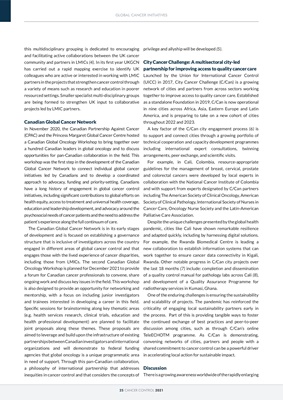
GLOBAL CANCER INITIATIVES
25 CANCER CONTROL 2021
this multidisciplinary grouping is dedicated to encouraging
and facilitating active collaborations between the UK cancer
community and partners in LMICs (4). In its first year UKGCN
has carried out a rapid mapping exercise to identify UK
colleagues who are active or interested in working with LMIC
partners in the projects that strengthen cancer control through
a variety of means such as research and education in poorer
resourced settings. Smaller specialist multi-disciplinary groups
are being formed to strengthen UK input to collaborative
projects led by LMIC partners.
Canadian Global Cancer Network
In November 2020, the Canadian Partnership Against Cancer
(CPAC) and the Princess Margaret Global Cancer Centre hosted
a Canadian Global Oncology Workshop to bring together over
a hundred Canadian leaders in global oncology and to discuss
opportunities for pan-Canadian collaboration in the field. This
workshop was the first step in the development of the Canadian
Global Cancer Network to connect individual global cancer
initiatives led by Canadians and to develop a coordinated
approach to advocacy, funding and priority-setting. Canadians
have a long history of engagement in global cancer control
initiatives, including significant contributions to global efforts on
health equity, access to treatment and universal health coverage,
education and leadership development, and advocacy around the
psychosocial needs of cancer patients and the need to address the
patient's experience along the full continuum of care.
The Canadian Global Cancer Network is in its early stages
of development and is focused on establishing a governance
structure that is inclusive of investigators across the country
engaged in different areas of global cancer control and that
engages those with the lived experience of cancer disparities,
including those from LMICs. The second Canadian Global
Oncology Workshop is planned for December 2021 to provide
a forum for Canadian cancer professionals to convene, share
ongoing work and discuss key issues in the field. This workshop
is also designed to provide an opportunity for networking and
mentorship, with a focus on including junior investigators
and trainees interested in developing a career in this field.
Specific sessions for brainstorming along key thematic areas
(e.g. health services research, clinical trials, education and
health professional development) are planned to facilitate
joint proposals along these themes. These proposals are
aimed to leverage and build upon the infrastructure of existing
partnerships between Canadian investigators and international
organizations and will demonstrate to federal funding
agencies that global oncology is a unique programmatic area
in need of support. Through this pan-Canadian collaboration,
a philosophy of international partnership that addresses
inequities in cancer control and that considers the concepts of privilege and allyship will be developed (5).
City Cancer Challenge: A multisectoral city-led
partnership for improving access to quality cancer care
Launched by the Union for International Cancer Control
(UICC) in 2017, City Cancer Challenge (C/Can) is a growing
network of cities and partners from across sectors working
together to improve access to quality cancer care. Established
as a standalone Foundation in 2019, C/Can is now operational
in nine cities across Africa, Asia, Eastern Europe and Latin
America, and is preparing to take on a new cohort of cities
throughout 2022 and 2023.
A key factor of the C/Can city engagement process (6) is
to support and connect cities through a growing portfolio of
technical cooperation and capacity development programmes
including international expert consultations, twinning
arrangements, peer exchange, and scientific visits.
For example, in Cali, Colombia, resource-appropriate
guidelines for the management of breast, cervical, prostate
and colorectal cancers were developed by local experts in
collaboration with the National Cancer Institute of Colombia
and with support from experts designated by C/Can partners
including The American Society of Clinical Oncology, American
Society of Clinical Pathology, International Society of Nurses in
Cancer Care, Oncology Nurse Society and the Latin-American
Palliative Care Association.
Despite the unique challenges presented by the global health
pandemic, cities like Cali have shown remarkable resilience
and adapted quickly, including by harnessing digital solutions.
For example, the Rwanda Biomedical Centre is leading a
new collaboration to establish information systems that can
work together to ensure cancer data connectivity in Kigali,
Rwanda. Other notable progress in C/Can city projects over
the last 18 months (7) include: completion and dissemination
of a quality control manual for pathology labs across Cali (8),
and development of a Quality Assurance Programme for
radiotherapy services in Kumasi, Ghana.
One of the enduring challenges is ensuring the sustainability
and scalability of projects. The pandemic has reinforced the
criticality of engaging local sustainability partners early in
the process. Part of this is providing tangible ways to foster
the continued exchange of best practices and peer-to-peer
discussion among cities, such as through C/Can's online
TeleECHOTM programme. As C/Can is demonstrating,
convening networks of cities, partners and people with a
shared commitment to cancer control can be a powerful driver
in accelerating local action for sustainable impact.
Discussion
There is a growing awareness worldwide of the rapidly enlarging